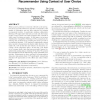Free Online Productivity Tools
i2Speak
i2Symbol
i2OCR
iTex2Img
iWeb2Print
iWeb2Shot
i2Type
iPdf2Split
iPdf2Merge
i2Bopomofo
i2Arabic
i2Style
i2Image
i2PDF
iLatex2Rtf
Sci2ools
168
click to vote
SIGIR
2011
ACM
2011
ACM
Collaborative competitive filtering: learning recommender using context of user choice
While a user’s preference is directly reflected in the interactive choice process between her and the recommender, this wealth of information was not fully exploited for learning recommender models. In particular, existing collaborative filtering (CF) approaches take into account only the binary events of user actions but totally disregard the contexts in which users’ decisions are made. In this paper, we propose Collaborative Competitive Filtering (CCF), a framework for learning user preferences by modeling the choice process in recommender systems. CCF employs a multiplicative latent factor model to characterize the dyadic utility function. But unlike CF, CCF models the user behavior of choices by encoding a local competition effect. In this way, CCF allows us to leverage dyadic data that was previously lumped together with missing data in existing CF models. We present two formulations and an efficient large scale optimization algorithm. Experiments on three real-world recom...
Related Content
| Added | 17 Sep 2011 |
| Updated | 17 Sep 2011 |
| Type | Journal |
| Year | 2011 |
| Where | SIGIR |
| Authors | Shuang-Hong Yang, Bo Long, Alexander J. Smola, Hongyuan Zha, Zhaohui Zheng |
Comments (0)

